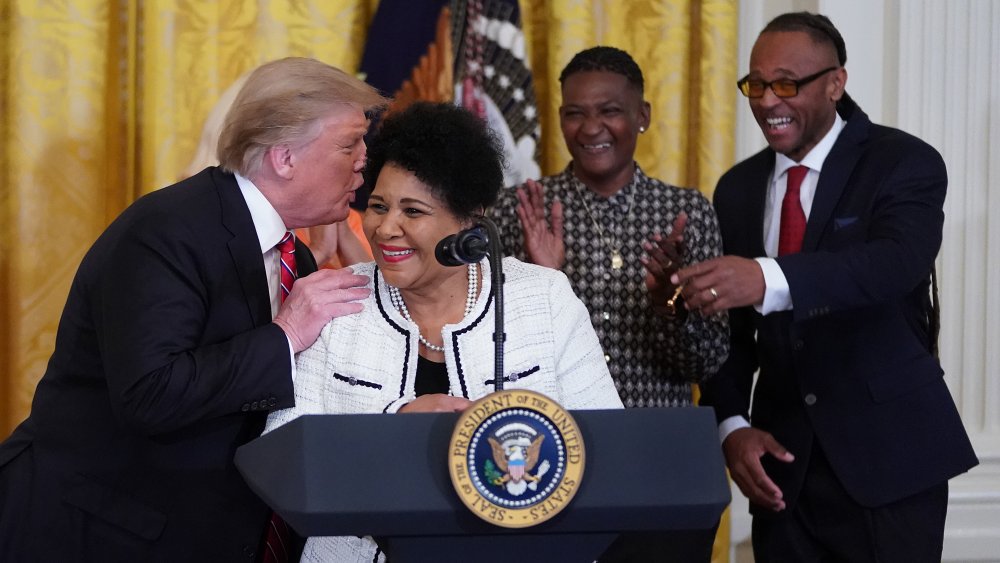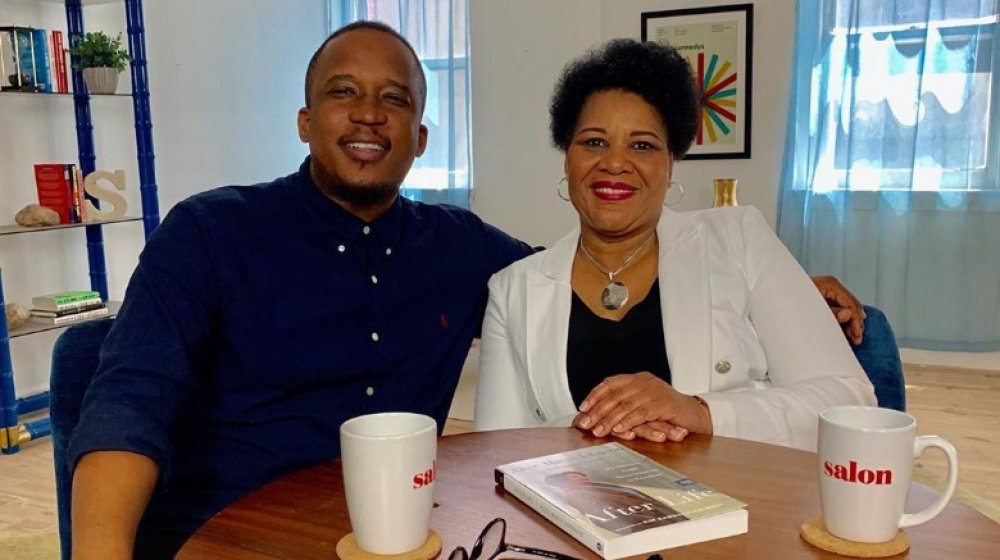What Alice Johnson Has Been Doing Since Being Granted Clemency
Maybe you saw the 2020 Super Bowl ad depicting President Trump as a champion of criminal justice reform (via The Washington Post). Alice Johnson was its star. The woman that Trump granted clemency to in 2018 — after Kim Kardashian met with Trump and asked him to — also attended Trump's 2019 State of the Union speech. There, he told the audience that her story "underscores the unfairness that can exist in criminal sentencing" (via Forbes). Johnson received a standing ovation. When she speaks again at the 2020 Republican National Convention, Johnson told The Columbus Dispatch, she hopes to be seen "as a picture of what redemption looks like."
Two years ago, Johnson was 22 years into a life sentence that she called "an unexecuted sentence of death" (via The New York Times). She'd been jailed in 1996 on nonviolent drug charges. In an interview with Salon, Johnson said she served as a low level "telephone mule" in a small scale cocaine distribution ring. She was startled at the severity of her sentence. "It's crazy how the system will, I can almost say, they write a fairy tale, almost, about you. If you don't agree to cooperate, if you don't plead guilty, I think it's almost like notches in the belt."
Since her release, Johnson has been busy helping other non-violent prisoners find real justice.
Alice Johnson helped three other inmates gain clemency
The first thing Alice Johnson did when she got out of jail was share a meal with her family. "Just simple stuff," she reflected to Salon afterward, like "picking up a fork — a real fork, not a plastic fork," made all the difference. Then, she got down to business. Before she was released, the ACLU held Johnson's case up as a symbol of the need to reform a system that systematically and disproportionately imprisons people of color. Even from behind bars, Alice Johnson had advocated tirelessly for such reform. Now, she's using all avenues available to continue.
She's now a senior fellow with the Texas Public Policy Foundation's Right on Crime initiative. She's also founded Taking Action for Good, an organization dedicated to criminal justice reform efforts. Johnson's advocacy efforts are credited as the "catalyst" behind the Trump administration passing the First Step Act in December 2018 (via Texas Public Policy Foundation). To date, the act has facilitated the release of more than 3,000 people and ensured that another 3,0000 have shorter sentences, more closely reflecting the severity of their crimes (via Brennan Center for Justice).
Finally, in early 2020, after Alice Johnson personally recommended them to President Donald Trump, Trump pardoned three of Johnson's fellow inmates, Crystal Munoz, Judith Negron, and Tynice Hall. "I'm not trying to be the pardon office ... but I am trying to offer a little help," Johnson told The Washington Post.
Alice Johnson wrote a memoir
Ehe undeniably formidable criminal justice advocate also has somehow found the time to write a memoir. After Life was published by Harper Collins in 2019 with a foreword by Kim Kardashian. Lisa Sharkey, SVP and Director of Creative Development at Harper Collins hopes that Johnson's deeply personal story will make readers reflect on "the injustice that permeates our society, in particular for women of color" (via Forbes). There's no denying that Johnson has a compelling story to tell.
As the daughter of a sharecropping family, Johnson describes the day that her parents were able to buy their own home as akin to "escaping slavery" (via Essence). She got married at 15, survived mental abuse in her marriage, and had her first children while still a teenager. She got divorced. She lost her job working at FedEx. She filed for bankruptcy. By the time she found another job, she was barely treading water, with five children to feed and bills to pay. That's when she decided to work as a phone mule (via Salon). But Johnson has categorically refused to be the victim. "I was supposed to draw my last dying breath in prison. I didn't pose a risk to society ... the time did not fit the crime," Johnson told Salon. " Unless more stories like mine are being told, it's not going to change."
After she's changed the world with her story? She's planning on becoming a playwright (Forbes).


